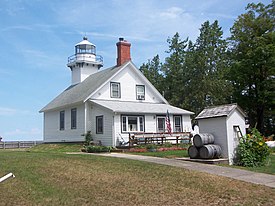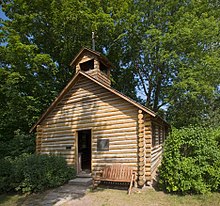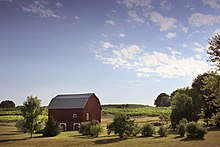Peninsula Township, Michigan
Peninsula Township, Michigan Old Mission Peninsula | |
|---|---|
 | |
| Nickname(s): "The Peninsula", "O.M.P." | |
 Location within Grand Traverse County | |
| Coordinates: 44°52′41″N 85°31′53″W / 44.87806°N 85.53139°W | |
| Country | |
| State | |
| County | |
| Organized | 1853 |
| Government | |
| • Supervisor | Isaiah Wunsch |
| • Clerk | Becky Chown |
| Area | |
• Total | 31.8 sq mi (82.5 km2) |
| • Land | 27.9 sq mi (72.2 km2) |
| • Water | 4.0 sq mi (10.3 km2) |
| Elevation | 594 ft (181 m) |
| Population (2020) | |
• Total | 6,068 |
• Estimate (2023) | 6,107 |
| • Density | 190.8/sq mi (73.6/km2) |
| Time zone | UTC-5 (Eastern (EST)) |
| • Summer (DST) | UTC-4 (EDT) |
| ZIP code(s) | |
| Area code | 231 |
| FIPS code | 26-63340[1] |
| GNIS feature ID | 1626889[2] |
| Website | Official website |
Peninsula Township is a civil township of Grand Traverse County in the U.S. state of Michigan. The township had a population of 6,068 at the 2020 census, an increase from 5,433 at the 2010 census.
Peninsula Township is coterminous with the Old Mission Peninsula, which projects about 17 miles (27 km) north from its base in Traverse City into Grand Traverse Bay, an arm of Lake Michigan. The peninsula divides the Grand Traverse Bay into an East Arm and West Arm. The peninsula is well known for its cherry harvest and viticulture, and is included in the Old Mission Peninsula AVA, a federally recognized viticultural region. At the northern tip of the peninsula is Mission Point Light, which lies just south of the 45th parallel north.[3]
Also included within Peninsula Township is Power Island, a small island in the West Arm of Grand Traverse Bay.

History
The settlement at Old Mission was the first community founded by Europeans in the Grand Traverse Bay region, as a duty of the federal government under the Treaty of Washington (1836). It was founded in May 1839 by Rev. Peter Dougherty and Rev. John Fleming.[4] They had spent the winter on Mackinac Island, and founded a Presbyterian mission at the small Old Mission Harbor, which of course did not yet have that name. The location is a convenient and strategic location along canoe routes between native settlements in the Grand Traverse Bay region. At the time of their arrival there were a few Native American residents of what appeared to be a nearly abandoned village at the harbor. These natives made smoke signals over their watch fire to summon a substantial number of men of the tribe to canoe across the bay to join the visitors for a multi-day parlay. The mission had peaceful relations with native residents in the surrounding area.[4] The settlement was originally known as Grand Traverse.
In June 1839 Henry Schoolcraft arrived at the mission in a small vessel and helped found a school there. By 1841 a seasonal village that was important for sheltering tribal members during trading expeditions, hunts, fishing endeavors, and gathering nearby wild rice had grown to a permanent village, with 5 log buildings as well as several wigwams at the settlement. By 1850 the settlement had grown to a considerable size, and the schooner Arrow was making weekly trips to the mission from Mackinaw City.[4]
In 1851, a post office was established in Grand Traverse, with W.R. Stone as first postmaster. This was the only official post office in the Grand Traverse Bay region, indeed the only one between Mackinaw City and Croton. In 1852, Rev. Dougherty decided to move his mission across the west bay along the Leelanau Peninsula to an existing Native American village at the site of modern Omena, thus establishing a "New Mission." The previous community was nicknamed as the "Old Mission" in the early 1850s. By the time of the civil war, the Presbyterian organization which funded Dougherty had financial difficulty, and missionary activities were discontinued. Dougherty sold his land there in 1868.[4]
In 1852, the U.S. Postal Service, in consultation with Albert Tracy Lay, a founding father of Traverse City, decided to rename the post office at Grand Traverse to "Old Mission" and named the post office at the Boardman River from "Grand Traverse City" to "Traverse City", as the former was too long a name per post office guidelines.[4][5]
In 1853, Peninsula Township was organized as one of Grand Traverse County's first two townships, the other being Traverse Township (taking up all of mainland Grand Traverse County, excluding the Old Mission Peninsula).[6]
Beginning in the early 1940s, the Michigan State Highway Department (now MDOT) constructed Center Road to allow for easier access up the peninsula, with motorists previously having to remain on narrow and winding shoreline roads.[7] Center Road is today the northernmost leg of state trunkline highway M-37.
Geography
Peninsula Township contains the landmass known as the Old Mission Peninsula, and Power Island. According to the United States Census Bureau, the township has a total area of 31.8 square miles (82.5 km2), of which 27.9 square miles (72.2 km2) is land and 4.0 square miles (10.3 km2) (13%) is water.
Old Mission Peninsula
The Old Mission Peninsula extends about 17 miles (27 km) from the Lower Peninsula of Michigan into Grand Traverse Bay, itself a bay of Lake Michigan. The peninsula separates Grand Traverse Bay into its West Arm and East Arm. Additionally, the peninsula is adjacent to Bowers Harbor and Old Mission Harbor, smaller inlets of the West Arm and East Arm, respectively. At its widest, the peninsula is only about 3.25 miles shore-to-shore (5.23 kilometers). Unlike the rest of mainland Grand Traverse County, the Old Mission Peninsula, like the neighboring Leelanau Peninsula, has unusually steep and rising terrain for the region. The northern end of the peninsula, however, is much flatter than the rest, and is a part of the Antrim–Charlevoix Drumlin Field.[8]
Major highway
 M-37 (historically known as Center Road) runs for 17.25 miles (27.76 km) along the backbone of the peninsula, terminating in a cul-de-sac at Old Mission Point. It was designated what is now known as a Pure Michigan Byway Scenic Route in June 2007.[9] The M-37 Scenic Heritage Route proposal is itself a unique resource concerning the character of the peninsula, and the activities along this byway.[10] South of the peninsula, in Traverse City, M-37 intersects highways US 31 and M-72.
M-37 (historically known as Center Road) runs for 17.25 miles (27.76 km) along the backbone of the peninsula, terminating in a cul-de-sac at Old Mission Point. It was designated what is now known as a Pure Michigan Byway Scenic Route in June 2007.[9] The M-37 Scenic Heritage Route proposal is itself a unique resource concerning the character of the peninsula, and the activities along this byway.[10] South of the peninsula, in Traverse City, M-37 intersects highways US 31 and M-72.
Communities

- Archie, a ghost town on the shore of East Grand Traverse Bay, at 44°50′06″N 85°32′23″W / 44.83500°N 85.53972°W. Archie was given a post office in 1885, which lasted until September 1900. The post office reopened the following December, but was closed again in 1902.[11]
- Mapleton is an unincorporated community roughly midway up the Old Mission Peninsula, along M-37 at 44°53′43″N 85°30′24″W / 44.89528°N 85.50667°W.[12] Mapleton was founded in 1859 by the Ogden family of New York state, with a post office opening the same year. The post office lasted until 1904.[13] Today, despite being a small community, Mapleton is marked by signage along M-37.
- Neahtawanta is a historic summer resort colony at 44°53′37.5″N 85°33′17.1″W / 44.893750°N 85.554750°W. The word "Neahtawanta" derives from Ojibwe words meaning "placid waters", in reference to Bowers Harbor. Neahtawanta was established in 1890 by the Neahtawanta Association, and a post office was established in 1907, only lasting until 1914.[14] Today, Neahtawanta is still occupied by large summer resort homes, and the Neahtawanta Inn remains open.[15][16]
- Ogdensburg, a ghost town at 44°55′41.7″N 85°30′18.5″W / 44.928250°N 85.505139°W. Ogdensburg was founded by the same Ogden family in 1855, and was one of the region's first settlements.[13] Today, all that remains is a cemetery.
- Old Mission is an unincorporated community in the township near the end of the peninsula on the east arm of the bay at 44°57′44″N 85°29′07″W / 44.96222°N 85.48528°W.[17]
- Traverse City is immediately adjacent Peninsula Township, bordering it to the south. Much of the south of Peninsula Township has suburbanized due to its proximity to Traverse City. Traverse City, though, is politically independent of Peninsula Township, and the two are administered separately.

Demographics
As of the census[1] of 2000, there were 5,265 people, 2,131 households, and 1,625 families residing in the township. The population density was 189.0 inhabitants per square mile (73.0/km2). There were 2,613 housing units at an average density of 93.8 per square mile (36.2/km2). The racial makeup of the township was 97.28% White, 0.06% African American, 0.36% Native American, 0.59% Asian, 0.97% from other races, and 0.74% from two or more races. Hispanic or Latino of any race were 2.01% of the population.
There were 2,131 households, out of which 27.5% had children under the age of 18 living with them, 70.4% were married couples living together, 4.7% had a female householder with no husband present, and 23.7% were non-families. 20.6% of all households were made up of individuals, and 10.5% had someone living alone who was 65 years of age or older. The average household size was 2.45 and the average family size was 2.84.
In the township the population was spread out, with 23.1% under the age of 18, 4.2% from 18 to 24, 19.3% from 25 to 44, 33.5% from 45 to 64, and 19.9% who were 65 years of age or older. The median age was 47 years. For every 100 females, there were 94.1 males. For every 100 females age 18 and over, there were 91.9 males.
The median income for a household in the township was $66,019, and the median income for a family was $82,426. Males had a median income of $52,750 versus $34,620 for females. The per capita income for the township was $40,753. About 1.1% of families and 2.3% of the population were below the poverty line, including 0.3% of those under age 18 and 2.3% of those age 65 or over.
Recreation
- The "Old Mission Peninsula Cruise" is considered to be a "serendipitous" adventure for road bike riders. It is favored by local riders, including bicycle clubs, because of the scenery, the quality of the road, and lack of traffic.[18]
- The peninsula is a great place to sea kayak. The bay offers a shelter from the prevailing westerly winds and from the Lake Michigan waves. One can get close to shore, the lighthouse, picnic grounds and parks. Maps, rentals and guided tours are available.[19]
- There are many recurrent and special events. A calendar is available.[20]

Produce
Wineries
There are eleven wineries on the Old Mission Peninsula. The Old Mission Peninsula sits close to the 45th parallel, a latitude known for growing prestigious grapes.[citation needed] The two Grand Traverse Bays provide the ideal maritime climate and the rich soil does the rest.[tone][citation needed] Northern Michigan specializes in growing white grapes and is known for its Rieslings which grow well in the summer months and late fall which Traverse City is known for.[citation needed] Every October the wineries host a harvest fest. Some Riesling grapes are spared being picked in the fall to be picked when they freeze, from which Ice Wine is made.
See also
References
- ^ a b "U.S. Census website". United States Census Bureau. Retrieved January 31, 2008.
- ^ U.S. Geological Survey Geographic Names Information System: Peninsula Township, Michigan
- ^ "45th Parallel - Old Mission Point". www.mnmuseumofthems.org. Retrieved October 18, 2023.
- ^ a b c d e "Chapter I". The Traverse Region, Historical and Descriptive with Illustrations of Scenery and Portraits and Biographical Sketches of Some of Its Prominent Men and Pioneers. Chicago: H. R. Page & Co. 1884. Retrieved October 21, 2022 – via MIGenWeb – Michigan Genealogy on the Web (part of the US GenWeb Project).
- ^ Wait, Steven Edwin and Anderson, William S. Old settlers: a historical and chronological record, together with personal experiences and reminiscences of members of the Old settlers of the Grand Traverse region. Traverse City, Michigan: [Ebner brothers], 1918. pp. 13-18.
- ^ "History in Grand Traverse County, Michigan". genealogytrails.com. Retrieved January 6, 2023.
- ^ Boursaw, Jane Louise (December 3, 2018). "Old Mission History: Building Center Road, 1940s - Photos". Retrieved January 6, 2023.
- ^ gtrlc_nate (January 16, 2019). "Drumlins". Grand Traverse Regional Land Conservancy. Retrieved October 29, 2022.
- ^ Skinner, Victor (March 7, 2008). "M-37 on Old Mission Designated Scenic Route". Traverse City Record-Eagle. OCLC 30098364. Archived from the original on March 21, 2014. Retrieved August 15, 2013.
- ^ M-37 Scenic Heritage Route management plan.
- ^ Romig, Walter (1986). Michigan Place Names: The History and Naming of More Than Five Thousand Past and Present Michigan Communities. Detroit: Wayne State University Press. p. 28. ISBN 0-8143-1838-X.
- ^ U.S. Geological Survey Geographic Names Information System: Mapleton, Michigan
- ^ a b Romig, Walter (1986). Michigan Place Names: The History of the Founding and the Naming of More Than Five Thousand Past and Present Michigan Communities. Detroit: Wayne State University Press. p. 350. ISBN 0-8143-1838-X.
- ^ Romig, Walter (1986). Michigan Place Names: The History of the Founding and the Naming of More Than Five Thousand Past and Present Michigan Communities. Detroit: Wayne State University Press. p. 389. ISBN 0-8143-1838-X.
- ^ "Neahtawanta Resort Association - Home". neahtawanta.wildapricot.org. Retrieved January 12, 2023.
- ^ "Neahtawanta Inn". www.neahtawantainn.com. Retrieved January 12, 2023.
- ^ U.S. Geological Survey Geographic Names Information System: Old Mission, Michigan
- ^ Trails.com, Old Mission Peninsula Cruise.
- ^ "Sea kayaking". Archived from the original on January 5, 2013. Retrieved December 21, 2007.
- ^ "Old Mission Peninsula –".
Further reading
- Clarke Historical Library, Central, Michigan University, Bibliography for Grand Traverse County
- Potter, Elizabeth V. The Story of Old Mission. (Ann Arbor, MI: Edward Brothers, 1956).




